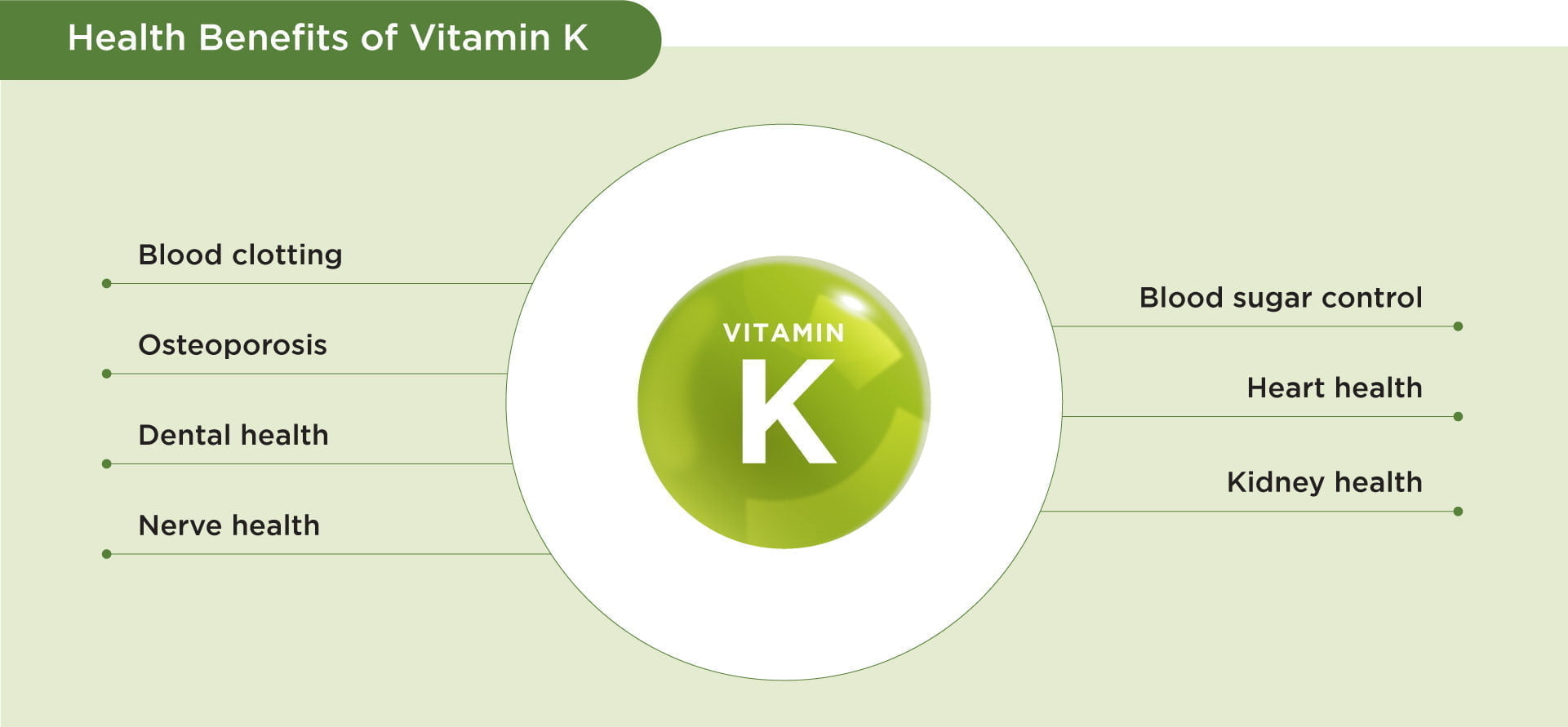Vitamin K

Vitamin K
Vitamin K is a fat-soluble vitamin which is important for the function of numerous proteins within the body. Vitamin K groups exist naturally include K1, K2, K3 and K4, but the most important are vitamin K1 (phylloquinone) and vitamin K2 (menaquinone). Both of the vitamin K1 and K2 have similar functions, but vitamin K2 is better absorbed and can be stored for a longer time in the human body than vitamin K1. In fact, vitamin K1 can be converted to vitamin K2 in the human body. Vitamin K2 is known to have 7 different forms which are MK-4 to MK-10 1. Vitamin K1 and vitamin K2 are required for the carboxylation of all vitamin K-dependent proteins. Vitamin K has potential in treating coronary heart disease, cancer and also improvements in bone strength and insulin sensitivity 1.
Nutritional Facts
Vitamin K1 mainly exists in chloroplasts of plants, such as kale, spinach and broccoli. Green leafy vegetables such as spinach and collards contain the highest known concentrations of vitamin K1 and contribute approximately 60% of total vitamin K1 intake. Therefore, the greener the vegetables, the more vitamin K1 they often contain. Vitamin K1 is also available in certain plant oils including canola, soybean, cottonseed and olive. Vitamin K2 is primarily of bacterial origin, except for MK-4. The longer-chain vitamin K2 of MK-7 is primarily the product of fermentation using Bacillus subtillis natto and is present in a traditional Japanese soybean-based product called natto. Natto contains approximately 2.5 times more MK-7 as compared to the vitamin K1 content of spinach 2.
Published Health Benefits
1. Blood clotting
Vitamin K is important for the formation of coagulation factors. These coagulation factors can work together to stop and heal wounds from continuously bleeding. Vitamin K deficiency can lead to excessive bleeding or bruising 3.
2. Osteoporosis
Vitamin K2 and vitamin D work synergistically to improve bone quality and strength. Meanwhile, vitamin K2 also activates osteocalcin which binds to calcium and promotes bone formation, thus making the bone less susceptible to fracture 4.
3. Dental health
Vitamin K2 can activate osteocalcin which is one of the main regulating proteins in dental health 5. Osteocalcin will stimulate the growth of new dentin. Dentin is the largest structural component of the human tooth which provides support to enamel (the thin outer covering of tooth) and prevents enamel fractures 6.
4. Nerve health
Higher vitamin K1 levels are associated with improved verbal episodic memory 7. Study found that Vitamin K is involved in protein production in the central nervous system and possesses neuroprotective effects which could prevent brain and nerve deterioration 8.
5. Blood sugar control
The largest study showed that vitamin K supplementation decreased diabetes risk by 7% 9. Vitamin K2 may help in improving insulin sensitivity and increases insulin production 10.
6. Heart health
Vascular calcification is an active process that causes cardiovascular disease. Adequate intake of vitamin K2 has been found to lower the risk of vascular damage because it inhibits the calcium from depositing in the vessel walls 11.
7. Kidney health
Vitamin K supplementation has been shown to improve renal artery function and prevent the development of renal artery calcification 9. Vitamin K activates matrix-GLA protein (MGP) which binds the excess calcium and phosphate ions to prevent renal artery calcification 12. It also has the potential to inhibit kidney stones or renal crystals formation 13.
Recomended Daily Doses
The recommended daily amount of vitamin K is 120 mcg/day for men and 90 mcg/day for women 14.
References:
1. DiNicolantonio, J. J., Bhutani, J. & O’Keefe, H. J. (2015). The health benefits of vitamin K. Open Heart, 2 (1): e000300. https://doi.org/10.1136/openhrt-2015-000300
2. Sarah, L. B. (2012). Vitamin K: Food composition and dietary intake. Food & Nutrition Research, 56: 5505. https://doi.org/10.3402/fnr.v56i0.5505
3. Girolami, A., Ferrari, S., Cosi, E., Santarossa, C. & Randi, M. L. (2018). Vitamin K-dependent coagulation factors that may be responsible for both bleeding and thrombosis (FII, FVII and FIX). Clin Appl Thromb Hemost, 24 (9): 42-47. https://doi.org/10.1177/1076029618811109
4. Kidd, P. M. Vitamin D and K as pleiotropic nutrients: Clinical importance to the skeletal and cardiovascular systems and preliminary evidence for synergy. Altern Med Rev, 15 (3): 199-222.
5. Shearer, M., Fu, X., & Booth, S. (2012). Vitamin K Nutrition, Metabolism, and Requirements: Current Concepts and Future Research. Advances In Nutrition, 3(2), 182-195. https://doi.org/10.3945/an.111.001800
6. Thaweboon, S., Thaweboon, B., Choonharuangdej, S., Chunhabundit, P. & Suppakpatana, P. (2005). Induction of type I collagen and osteocalcin in human dental pulp cells by retinoic acid. Southeast Asian J Trop Med Public Health, 36 (4): 1066-1069.
7. Presse, N., Belleville, S., Gaudreau, P., Greenwood, C. E., Kergoat, M.-J., Morais, J. A. & Ferland, G. (2013). Vitamin K status and cognitive function in healthy older adults. Neurobiology of Aging, 34(12), 2777–2783. https://doi.org/10.1016/j.neurobiolaging.2013.05.031
8. Bourre, J. M. (2006). Effects of nutrients (in food) on the structure and function of the nervous system: update on dietary requirements for brain. Part 1: micronutrients. J Nutr Health Aging, 10 (5): 377-385.
9. Halder, M., Petsophonsakul, P., Akbulut, A. C., Pavlic, A., Bohan, F., Anderson, E., Maresz, K., Kramann, R. & Schurgers, L. (2019). Vitamin K: Double bonds beyond coagulation insights into differences between vitamin K1 and K2 in health and disease. Int J Mol Sci, 20 (4): 896. https://doi.org/10.3390/ijms20040896
10. Booth, S. L., Centi, A. & Smith, S.R. & Gundberg, C. (2012). The role of osteocalcin in human glucose metabolism: Marker or mediator? Nat Rev Endocrinol, 9: 43–55. https://doi.org/10.1038/nrendo.2012.201
11. Schurgers, L. J. (2013). Vitamin K: key vitamin in controlling vascular calcification in chronic kidney disease. Kidney International, 83 (5): 782-784. https://doi.org/10.1038/ki.2013.26
12. Grzejszczak, P. & Kurnatowska, I. (2021). Role of vitamin K in CKD: Is its supplementation advisable in CKD patients?. Kidney and Blood Pressure Research, 46: 523-530. https://doi.org/10.1159/000516611
13. Li, Y., Lu, X., Yang, B., Mao, J., Jiang, S., Yu, D., Pan, J., Cai, T., Yasui, T. & Gao, B. (2019). Vitamin K1 inhibition of renal crystal formation through matrix gla protein in the kidney. Kidney and Blood Pressure Research, 44: 1392-1403. https://doi.org/10.1159/000503300
14. Bruno, E. J. (2016). The prevalence of vitamin K deficiency/insufficiency and recommendations for increased intake. Journal of Human Nutrition & Food Science, 4 (1): 1077-1080.








